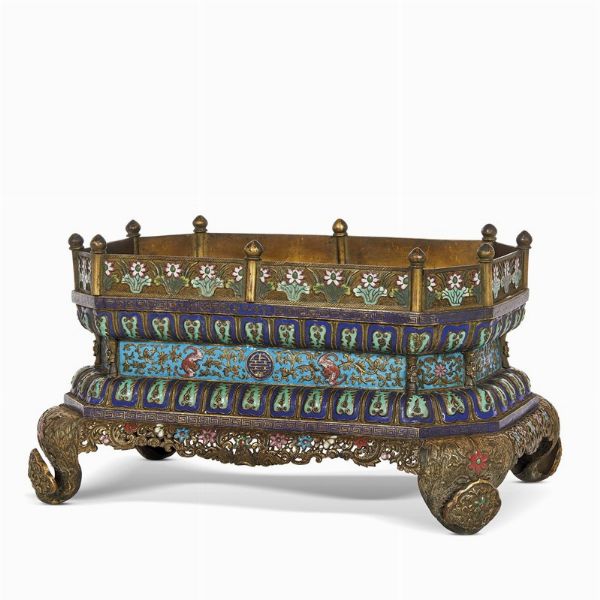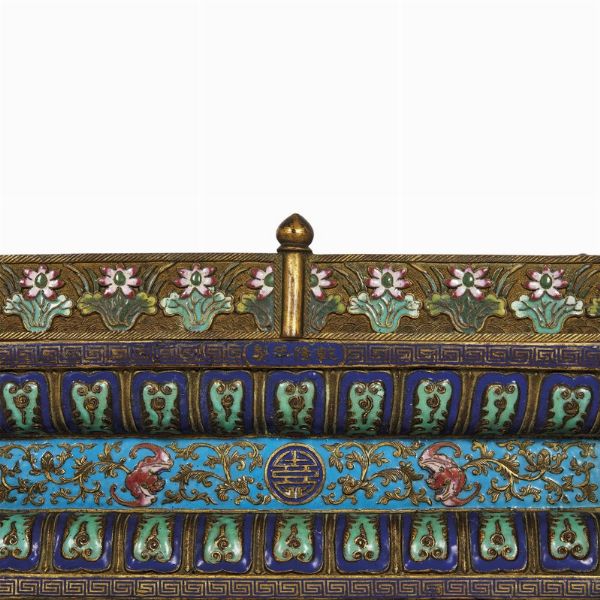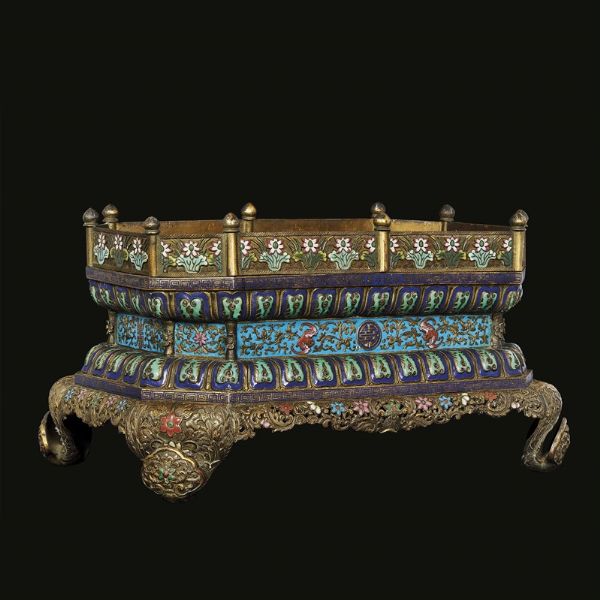

SHARE
76
BASE, CINA, DINASTIA QING, SEC. XVIII
BASE, CINA, DINASTIA QING, SEC. XVIII
in cloisonné con smalto spesso, decorato con fiori di loto, motivi Hui, petali stilizzati, pipistrelli e rami avvolgenti.
Inoltre i motivi riportati sulla parte superiore prendono ispirazione dalle monete antiche in segno di buon auspicio, e i quattro piedi a sostegno della base esagonale sono a foma di Ruyi. Nel complesso i motivi riportati sull'oggetto auspicano tutti a una buona vita e alla pace, sia in termini di ricchezza che di longevità.
Possiamo trovare un riferimento nella collezione permanente del museo di HeNan in Cina, in cui notiamo che questa base fa da supporto a un elefante imperiale, anch'esso simbolo di ricchezza.
Alt. cm 22,8 Lunghe. cm 40 Prof. cm 28,3
清 十八世纪 铜胎珐琅福寿纹八角台 高 22,8 厘米 宽 40厘米 纵深 28,3厘米
以中国传统的吉祥图案“覆莲”“富贵不断头”来装饰,其造型象征太平、平安之意。与河南博物院展出的珐琅器“景泰蓝”——珐琅太平有象的八角台相似。
A BASE, CHINA, QING DYNASTY, 18TH CENTURY
in thick enamel cloisonné, adorned with lotus flowers, Hui motifs, stylized petals, bats, and winding branches. Additionally, the motifs depicted on the top draw inspiration from ancient coins as a symbol of good fortune, and the four feet supporting the hexagonal base are in the shape of Ruyi. Overall, the motifs on the object auspicate a good life and peace, both in terms of wealth and longevity. We can find a reference in the permanent collection of the museum in HeNan, China, where we notice that this base supports an imperial elephant, also a symbol of wealth. Height 22.8 cm long. 40 cm Depth 28.3 cm
in cloisonné con smalto spesso, decorato con fiori di loto, motivi Hui, petali stilizzati, pipistrelli e rami avvolgenti.
Inoltre i motivi riportati sulla parte superiore prendono ispirazione dalle monete antiche in segno di buon auspicio, e i quattro piedi a sostegno della base esagonale sono a foma di Ruyi. Nel complesso i motivi riportati sull'oggetto auspicano tutti a una buona vita e alla pace, sia in termini di ricchezza che di longevità.
Possiamo trovare un riferimento nella collezione permanente del museo di HeNan in Cina, in cui notiamo che questa base fa da supporto a un elefante imperiale, anch'esso simbolo di ricchezza.
Alt. cm 22,8 Lunghe. cm 40 Prof. cm 28,3
清 十八世纪 铜胎珐琅福寿纹八角台 高 22,8 厘米 宽 40厘米 纵深 28,3厘米
以中国传统的吉祥图案“覆莲”“富贵不断头”来装饰,其造型象征太平、平安之意。与河南博物院展出的珐琅器“景泰蓝”——珐琅太平有象的八角台相似。
A BASE, CHINA, QING DYNASTY, 18TH CENTURY
in thick enamel cloisonné, adorned with lotus flowers, Hui motifs, stylized petals, bats, and winding branches. Additionally, the motifs depicted on the top draw inspiration from ancient coins as a symbol of good fortune, and the four feet supporting the hexagonal base are in the shape of Ruyi. Overall, the motifs on the object auspicate a good life and peace, both in terms of wealth and longevity. We can find a reference in the permanent collection of the museum in HeNan, China, where we notice that this base supports an imperial elephant, also a symbol of wealth. Height 22.8 cm long. 40 cm Depth 28.3 cm
Arte Orientale 东方艺术
mer 8 MAGGIO 2024










